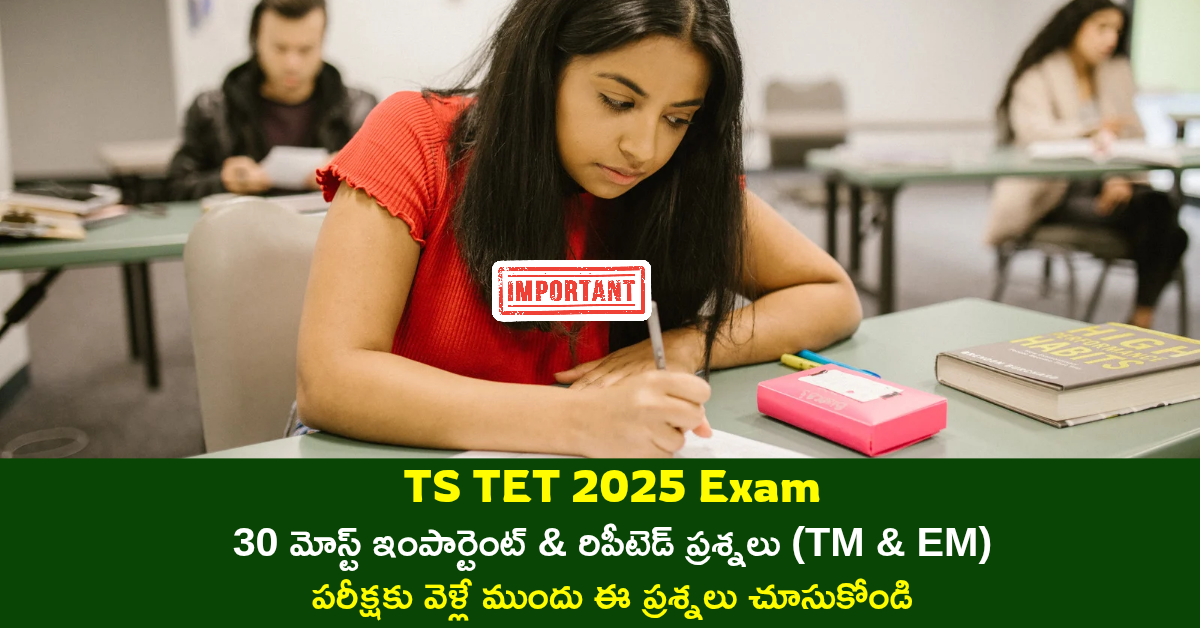TS TET Exam 2025:
తెలంగాణ టెట్ 2025 పరీక్షలను జూన్ 18వ తేదీ నుండి 30వ తేదీ వరకు నిర్వహిస్తున్న విషయం మీకు తెలిసిందే. ఇప్పటికే పరీక్షలు ప్రారంభమైన నేపథ్యంలో పరీక్షకు హాజరయ్యేటువంటి అభ్యర్థులు, ఈ వెబ్సైట్లోని ముఖ్యమైనటువంటి 30 ప్రశ్నలు చదువుకొని పరీక్షకు వెళ్ళండి. అవి మోస్ట్ ఇంపార్టెంట్ మరియు రిపీటెడ్ గా అడుగుతున్నటువంటి ప్రశ్నలు కాబట్టి మీకు పరీక్షల్లో చాలా ఉపయోగపడే అవకాశం ఉంటుంది. ఇందులో మీకు pedagogy, child development, language, environmental studies లాంటి కీలకమైనటువంటి ప్రశ్నలు ఉన్నాయి.
ఈ ప్రశ్నలను ఇంగ్లీష్ మీడియం మరియు తెలుగు మీడియం అభ్యర్థులకు ఉపయోగపడే విధంగా ప్రిపేర్ చేయడం జరిగింది.ప్రశ్న యొక్క సమాధానం కూడా తెలుగు మరియు ఇంగ్లీష్ భాషల్లో ఇచ్చాము. ఈ బిట్స్ మీకు పేపర్ వన్ మరియు పేపర్ తో రెండింటికి ఉపయోగపడతాయి కావున ప్రతి ఒక్కరు కూడా ఈ ఆర్టికల్ లోని ముఖ్యమైనటువంటి ప్రశ్నలు చూడండి.
TS TET 2025 most important and repeated questions:
1. Who is known as the father of modern education in India?. భారతదేశంలో ఆధునిక విద్యకు పితామహుడు అని ఎవరిని పిలుస్తారు?
సమాధానం,: Lord Macaulay – లార్డ్ మక్కౌలే
2. What is the full form of NCF?. NCF అనే పదం పూర్తి రూపం ఏమిటి?
సమాధానం: National curriculum framework – నేషనల్ కరెక్యులం ప్రేమ్ వర్క్
3. Which method is suitable for slow learners?. నెమ్మదిగా నేర్చుకునే విద్యార్థులకు ఏ బోధన పద్ధతి సరిపోతుంది.?
సమాధానం: remedial teaching- రెమెడియన్ టీచింగ్
4. constructivism is associated with which educationist?. కన్స్ట్రక్టివిజం సిద్ధాంతాన్ని ప్రవేశపెట్టిన విద్యావేత్త ఎవరు?
సమాధానం: Jean Piaget – జీన్ పీయాగెట్
5.According to RTE Act 2009, what is the age group for a free and compulsory education?. RTE చట్టం 2009 ప్రకారం, ఉచిత మరియు తప్పనిసరి విద్యకు వయస్సు ఎంత ఉండాలి?.
సమాధానం: 6 to 14 Years – 6 నుండి 14 సంవత్సరాలు
6. Zone of proximal development (zpd) was proposed by?. జోన్ ఆఫ్ ప్రాక్సిమాల్ డెవలప్మెంట్ అనే భావనను ఎవరు ప్రతిపాదించారు?
సమాధానం :Lev Vygotsky – లెవ్ వైగోత్స్కీ
7. What is the best method for teaching environmental studies?.పర్యావరణ అధ్యయన బోధనకు ఉత్తమ పద్ధతి ఏది?
సమాధానం: activity based learning – క్రియాశీలన బోధన
8. Who introduced the concept of “scaffolding” in learning?. స్కాఫోల్డింగ్” అనే అభ్యాస సంబంధిత భావనను ఎవరు పరిచయం చేశారు?
సమాధానం: Vygotsky – వైగోత్స్కీ
9. What is the average IQ level of average child?. ఒక సాధారణ విద్యార్థి యొక్క సగటు ఐక్యూ స్థాయి ఎంత?
సమాధానం: 90–110 – 90 నుండి 110 మధ్య
10. Who developed the theory of multiple intelligence?. మల్టిపుల్ ఇంటెలిజెన్స్ సిద్ధాంతాన్ని అభివృద్ధి చేసిన వారు ఎవరు?
సమాధానం: Howard Gardner – హోవర్డ్ గార్డ్నర్
11. What is the aim of Diagnostic teaching?. డయాగ్నొస్టిక్ బోధన యొక్క ఉద్దేశం ఏమిటి?.
సమాధానం : to identify learning difficulties – విద్యార్థి సమస్యలను గుర్తించడం
12. Who introduced the continuous and comprehensive evolution (CCE) ?.CCE అనే విధానాన్ని ప్రవేశపెట్టిన వారు ఎవరు?
సమాధానం: CBSE
13. Which of the following is not a language is skill?. కింది వాటిలో భాషా నైపుణ్యం కానిది ఏమిటి?
సమాధానం: drawing – డ్రాయింగ్
14. What is the inclusion in education?. విద్యలో ఇంక్లూషన్ ఏమిటి?
సమాధానం: education for all children including differently abled – అన్ని రకాల విద్యార్థులకు సమాన విద్యా అవకాశాలు
15. What is the main purpose of assessment?. మూల్యాంకనం యొక్క ప్రధాన ఉద్దేశం ఏమిటి?
సమాధానం: to improve student learning- విద్యార్థి అభ్యాసాన్ని మెరుగుపరచడం
16. When was the RTE Act implemented?. RTE చట్టాన్ని ఎప్పుడు అమలు చేశారు ?
సమాధానం : 2009
17. Who proposed the idea of child centred education?. చైల్డ్ సెంటర్ ఎడ్యుకేషన్ అనే భావన ఎవరి సూత్రం?
సమాధానం: Mahatma Gandhi – మహాత్మా గాంధీ
18. Which method is best for teaching mathematics?. గణిత బోధనకు ఉత్తమ పద్ధతి ఏమిటి ?
సమాధానం: problem solving method – సమస్య పరిష్కార పద్ధతి
19. Peer learning is based on which theory?. పియర్ లార్ని ఏ సిద్ధాంతానికి ఆధారంగా ఉంది?
సమాధానం : social constructivism – సామాజిక నిర్మాణ సిద్ధాంతం
20. Dyslexia is related to which learning difficulty?. డైస్లెక్సియా ఏ సమస్యను సూచిస్తుంది?
సమాధానం: reading difficulty – చదవడంలో తేడాలు
21. Which teaching aid is considered most effective in classroom?. తరగతిలో ఉత్తమ బోధన సహాయకం ఏది?
సమాధానం : visual aids – విజువల్ ఎయిడ్స్
22. What is the main objective of for teaching EVS?. EVS బోధనలో ప్రధాన లక్ష్యం ఏమిటి?
సమాధానం : environmental awareness- పర్యావరణ అవగాహన కల్పించడం
23. Child development includes which aspects?. చైల్డ్ డెవలప్మెంట్ లో ఏ అంశాలు ఉంటాయి?
సమాధానం: physical, cognitive, emotional and social – శారీరక, మానసిక, భావోద్వేగ, సామాజిక
24. Who proposed the three domains of learning?. లెర్నింగ్ లో మూడు డొమైన్లను ఎవరు సూచించారు?
సమాధానం : Benjamin Bloom – బెంజమిన్ బ్లూమ్
25. What is the best way to manage hyper active child?. హైపర్ యాక్టివ్ విద్యార్థిని ఎలా నిర్వహించాలి?
సమాధానం: give structured and engaging tasks – ఆకర్షణీయమైన మరియు సుస్పష్టమైన పనులు ఇవ్వాలి
26. What does curriculum mean? కరిక్యులం అంటే ఏమిటి?
సమాధానం: total learning experience – విద్యార్థికి ఇవ్వబడే మొత్తం అబ్యాస అనుభవం
27. When is summative assessment conducted?. సమ్మేటివ్ అసెస్మెంట్ ఎప్పుడు నిర్వహించబడుతుంది?
సమాధానం: at the end of a term – టర్మ్ చివర
28. Who promoted “learning by doing”?. చేసుకుంటూ నేర్చుకోవడం అనే భావన ఎవరిది?
సమాధానం :John Dewey – జాన్ డ్యూయీ
29. What is the critical pedagogy?. క్రిటికల్ పెడగాగి అంటే ఏమిటి?
సమాధానం : teaching that helps learners to question and challenge – ప్రశ్నించే , విశ్లేషించే విద్యా విధానం.
30. According to piaget, which stage follows the pre operational stage?. పియాజే సిద్ధాంతం ప్రకారం, ఫ్రీ ఆపరేషన్ దశ తర్వాత ఏ దశ వస్తుంది?
సమాధానం: concrete operational stage – కాంక్రీట్ ఆపరేషనల్ దశ
• ఇంకా ఇలాంటి బిట్స్ కావాలి అంటే కామెంట్ చేయండి.
